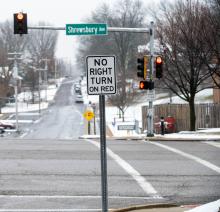New York City is now working towards cutting out traffic deaths, as part of a Vision Zero programme. The strategy is already seeing major benefits with traffic fatalities having been reduced by 23% since 2013. An official report reveals that the city’s road safety programme is having a positive effect, due in part to the use of data to identify prime factors in road deaths from crashes.
New York City is now working towards cutting out traffic deaths, as part of a Vision Zero programme. The strategy is already seeing major benefits with traffic fatalities having been reduced by 23% since 2013. An official report reveals that the city’s road safety programme is having a positive effect, due in part to the use of data to identify prime factors in road deaths from crashes.
In 2015, New York City Department of Transportation (DOT) and New York Police Department (NYPD) began working together to develop a strategy to address pedestrian issues. This concentrated on factors such as street redesign, enforcement, education and engagement resources and focussed on intersections and stretches of road with the highest crash rates for each borough. The policy is now proving its worth and safety improvements at these locations are now outpacing the overall reduction in traffic deaths across the city.
In the five years prior to Vision Zero there were 141 deaths annually at the priority locations. This has now been lowered to 100 fatalities, a reduction of 29% decline. Meanwhile pedestrian fatalities have also been lowered from around 99/year in the period from 2009-2013, to 72 in 2016, a drop of 27%.
The DOT and NYPD also carried out an analysis of crash trends in 2016 and revealed that the earlier onset of darkness in the fall and winter is correlated with a 40% jump in fatal and severe injury crashes involving pedestrians in the early evening hours.
To tackle this problem the Vision Zero Task Force developed a multi-agency enforcement and education strategy that increased evening and nighttime enforcement by NYPD officers and Taxi and Limousine Commission (TLC) inspectors. Following this effort traffic fatalities dropped 30%.
Protection for other vulnerable road users has also been implemented and the DOT has carried out 242 projects aimed at boosting safety. These include simplifying complex intersections, narrowing lanes, adding 30km of bicycle paths, making pedestrians and cyclists more visible, and shortening pedestrian crossing distances.
In 2015, New York City Department of Transportation (DOT) and New York Police Department (NYPD) began working together to develop a strategy to address pedestrian issues. This concentrated on factors such as street redesign, enforcement, education and engagement resources and focussed on intersections and stretches of road with the highest crash rates for each borough. The policy is now proving its worth and safety improvements at these locations are now outpacing the overall reduction in traffic deaths across the city.
In the five years prior to Vision Zero there were 141 deaths annually at the priority locations. This has now been lowered to 100 fatalities, a reduction of 29% decline. Meanwhile pedestrian fatalities have also been lowered from around 99/year in the period from 2009-2013, to 72 in 2016, a drop of 27%.
The DOT and NYPD also carried out an analysis of crash trends in 2016 and revealed that the earlier onset of darkness in the fall and winter is correlated with a 40% jump in fatal and severe injury crashes involving pedestrians in the early evening hours.
To tackle this problem the Vision Zero Task Force developed a multi-agency enforcement and education strategy that increased evening and nighttime enforcement by NYPD officers and Taxi and Limousine Commission (TLC) inspectors. Following this effort traffic fatalities dropped 30%.
Protection for other vulnerable road users has also been implemented and the DOT has carried out 242 projects aimed at boosting safety. These include simplifying complex intersections, narrowing lanes, adding 30km of bicycle paths, making pedestrians and cyclists more visible, and shortening pedestrian crossing distances.





